状语从句——条件状语从句 教案
if条件状语从句教案
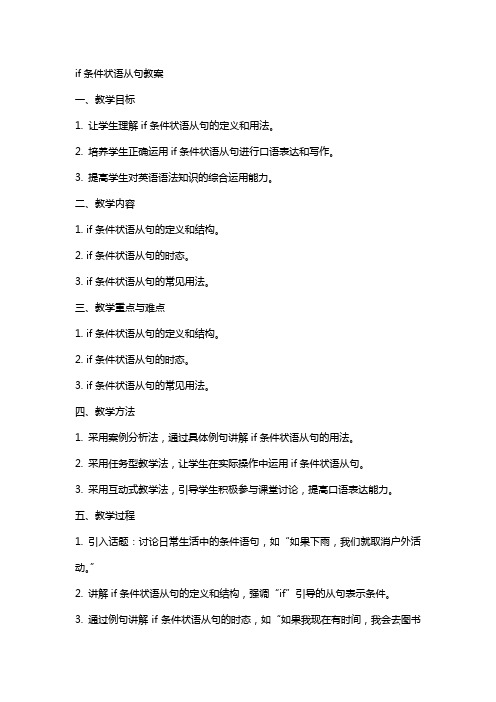
if条件状语从句教案一、教学目标1. 让学生理解if条件状语从句的定义和用法。
2. 培养学生正确运用if条件状语从句进行口语表达和写作。
3. 提高学生对英语语法知识的综合运用能力。
二、教学内容1. if条件状语从句的定义和结构。
2. if条件状语从句的时态。
3. if条件状语从句的常见用法。
三、教学重点与难点1. if条件状语从句的定义和结构。
2. if条件状语从句的时态。
3. if条件状语从句的常见用法。
四、教学方法1. 采用案例分析法,通过具体例句讲解if条件状语从句的用法。
2. 采用任务型教学法,让学生在实际操作中运用if条件状语从句。
3. 采用互动式教学法,引导学生积极参与课堂讨论,提高口语表达能力。
五、教学过程1. 引入话题:讨论日常生活中的条件语句,如“如果下雨,我们就取消户外活动。
”2. 讲解if条件状语从句的定义和结构,强调“if”引导的从句表示条件。
3. 通过例句讲解if条件状语从句的时态,如“如果我现在有时间,我会去图书馆。
”4. 分析if条件状语从句的常见用法,如表示假设、建议、条件等。
5. 进行分组练习,让学生运用if条件状语从句进行口语表达。
6. 布置课后作业:用if条件状语从句编写一段小故事。
教学反思:在教学过程中,要注意引导学生正确理解if条件状语从句的定义和用法,并通过大量例句进行讲解和练习。
要关注学生的个体差异,根据学生的实际情况进行教学调整,确保教学效果的达成。
六、教学评价1. 采用课堂观察法,评价学生在课堂上的参与度和口语表达能力。
2. 通过课后作业,评价学生对if条件状语从句的掌握程度。
3. 进行小组讨论,评价学生之间的合作能力和创新思维。
七、教学拓展1. 引导学生思考if条件状语从句在现实生活中的应用,提高学生的语言运用能力。
2. 介绍其他类型的条件状语从句,如虚拟条件状语从句等,扩大学生的语法知识范围。
3. 组织学生进行相关英语角活动,提高学生的口语交流能力。
条件状语从句教案

条件状语从句教案【篇一:八年级时间状语从句教案】2013年第几讲教学课题:module 8public holidays教学目标:1..课文中重点单词、词组、句子的理解与掌握2.课文与单词的朗读与翻译要求掌握3语法:时间状语从句教学重点:课文与单词的朗读与翻译要求掌握教学难点:语法:时间状语从句教学过程:一.greetings二.dictation1words 2 phrases3 sentences:三.语法——时间状语从句定义:英语中可以用句子表达一件事情或一个行为发生的时间,这个句子就叫时间状语从句。
时间状语从句常用when, as, while, before, after, since, till, until, as soon as等连词来引导。
1.由when引导的时间状语从句when意为“当…的时候”,when引导的从句的谓语动词可以是延续性的动词,又可以是瞬间动词。
eg:when the teacher came in, the students stopped talking.he knocked at the door , when my mother was sleeping.2.由while引导的时间状语从句“与…同时,在…期间”,谓语动词必须是延续性动词。
eg:lucy was cleaning the room while lily was listening to music.3. 由before/after 引导的时间状语从句,before“在…之前”,after“在…之后” eg:he went to the office before he visited mr. zhong.i called betty after i finished the homework.4. 由until引导的时间状语从句,“直到…为止”,not until “直到…才”eg:he stayed in the room until his mother came back .we didn’t begin the meeting until the boss came.5. 由as soon as 引导的时间状语从句,“一…就”eg:i took out the notebook as soon as the class began.四.时间状语从句要注意的几个地方(1)例如:it was raining hard(下大雨) when got to school yesterday.while he was doing his homework, the telephone rang. the lake, he sang happily.he had learned a little chinese before he came to china.after he finished middle school, he went to work in a factory.(2)在时间状语从句里,通常不用将来时态,用现在时态表示将来的动作或状态。
状语从句全类型讲解教案

状语从句全类型讲解教案一、引言。
状语从句是复合句的一种,用来修饰主句,表示时间、原因、条件、让步、目的等不同的关系。
状语从句的类型有很多,包括时间状语从句、原因状语从句、条件状语从句、让步状语从句、目的状语从句等。
掌握状语从句的不同类型对于提高写作和阅读能力非常重要。
本教案将全面讲解状语从句的各种类型,帮助学生更好地掌握状语从句的用法。
二、时间状语从句。
时间状语从句用来表示主句发生的时间,常见的引导词有when, while, as, before, after, since, until等。
例如:When I was young, I used to play basketball every day.After she finished her homework, she went to bed.时间状语从句表示的时间可以是过去、现在或将来,根据主句的时态来确定。
需要注意的是,如果主句是一般现在时,时间状语从句通常使用一般过去时表示过去的动作或状态;如果主句是一般过去时,时间状语从句通常使用过去完成时表示更早的过去。
三、原因状语从句。
原因状语从句用来表示主句发生的原因,常见的引导词有because, since, as, for, now that等。
例如:Because it was raining, we stayed at home.Since she was tired, she went to bed early.原因状语从句表示的原因可以是客观原因或主观原因,需要根据具体语境来确定。
需要注意的是,原因状语从句通常放在主句之前,用逗号隔开时则可以放在主句之后。
四、条件状语从句。
条件状语从句用来表示主句发生的条件,常见的引导词有if, unless, provided that, on condition that等。
例如:If it rains tomorrow, we will stay at home.Provided that you finish your homework, you can go outto play.条件状语从句表示的条件可以是真实的、非真实的或虚拟的,需要根据具体语境来确定。
条件状语从句教学设计
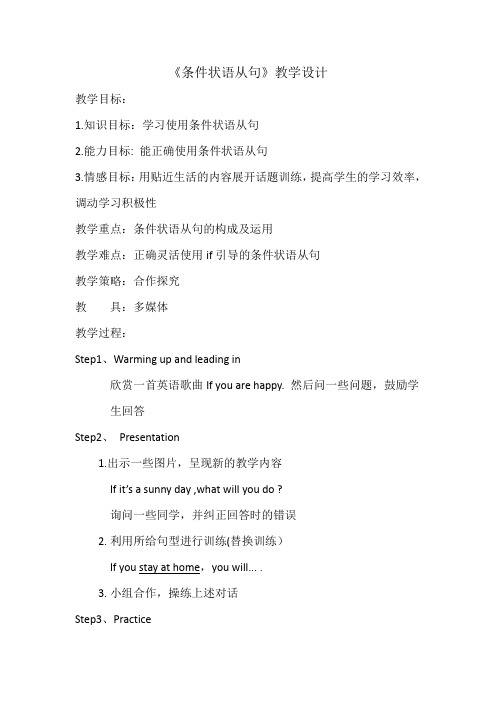
《条件状语从句》教学设计
教学目标:
1.知识目标:学习使用条件状语从句
2.能力目标: 能正确使用条件状语从句
3.情感目标:用贴近生活的内容展开话题训练,提高学生的学习效率,调动学习积极性
教学重点:条件状语从句的构成及运用
教学难点:正确灵活使用if引导的条件状语从句
教学策略:合作探究
教具:多媒体
教学过程:
Step1、Warming up and leading in
欣赏一首英语歌曲If you are happy. 然后问一些问题,鼓励学
生回答
Step2、Presentation
1.出示一些图片,呈现新的教学内容
If it’s a sunny day ,what will you do ?
询问一些同学,并纠正回答时的错误
2.利用所给句型进行训练(替换训练)
If you stay at home,you will... .
3.小组合作,操练上述对话
Step3、Practice
1、利用白板出示习题,对条件状语从句结构进行训练
2、利用题卡,训练学生灵活使用条件状语从句
3、小组合作完成话题练习,并在全班展示
Step 4、Survey
小组总结本课重点
Step 5、Homework
1、学习歌曲If you are happy
2、Writing: If you have 1 million,what will you do?。
《if 引导的条件状语从句》教案
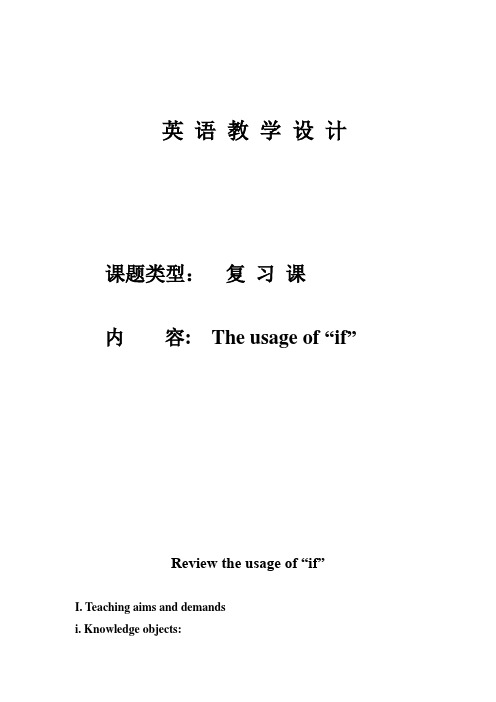
英语教学设计课题类型:复习课内容: The usage of “if”Review the usage of “if”I. Teaching aims and demandsi. Knowledge objects:1. Review the usage of “ if ”in adverbial clauses of condition2. Review the usage of “if” in subjunctive mood3. Review the usage of “if” in objective clausesii. Ability object:Train students’ speaking abilityiii. Moral object:Make students know more about helping the people in troubleII. Teaching key points1. How to tell the differences among the three situations2. How to do exercises more correctly according to what we reviewed III. Teaching difficult points1. Tell the differences between the usage of “if” i n adverbial clauses of condition and in subjunctive mood2. How to use “if” in these three different situationsIV. Teaching methods1. Sentence chains activity to help2. Competition3. Talk about the picturesV. Teaching aidssome colorful cards, The blackboard , A projectorVI. Teaching proceduresStepI.lead in and review the usage of “if” in adverbial clauses of condition.Listen to a song----“If you’re happy”. Students listen to it a nd summarize the usage of “if” in adverbial clauses of condition.eg, 1. If it rains tomorrow, I won’t go shopping.2. If he is free, he may help you.(use a song to lead in the grammar, students may be interested in it, it also activates the class atmosphere)StepII. Sentence chainDivide the class into two groups, students in each group make sentences using if adverbial clauses of condition one by one, the group can’t follow will lose the game.(Consolidate the usage of “if” in adv erbial clauses of condition) StepIII. Review the usage of “if” in subjunctive moodShow a video of the movie “Da Hua Xi You”. Then let students know the meaning of “if” here is “如果”, but it is impossible, this is the difference between “if” in adverbial clauses of condition and “if” in subjunctive mood. Then sum up the usage of “if” in this situation.eg, 1. If I had one more chance, I would say to the girl “I love you”.2. If I were you, I wouldn’t go.StepIV. Talk about the picturesShow a picture about the earthquake in Japan, then ask students “If you were a student in Japan, what would you do?”. Students talk about this topic using the usage of “if” in subjunctive mood.(Practice the speaking ability using the usage of “if” in subjunctive mood.)StepV. Review the usage of “if” in objective clausesi. S tudents think over the third usage of “if”The meaning of “if” here is “是否”, so it is simple to distinguish it.eg, 1. I don’t know i f he will pass the exam.2. I wonder if you have told the news to Li Lei.ii. S ummarize the usage of “if” in objective clauses.StepVI. ExercisesAfter revision, do some exercises on the screen.(Consolidate the teaching aims in this class)StepVII. GameShow some sentences of “if” of different usage, divide the class into groups of six, and then hand out some colorful cards; students divide the sentences into the correct usage and write the number on the colorful card. The group finishes it most quickly and correctly will win the game and will win the award.(Consolidate what we reviewed in this class.)StepVIII. SummaryIn this class, we reviewed all the usage of “if”, the usage of “if” i n adverbial clauses of condition, the usage of “if” in subjunctive mood, the usage of “if” in objective clauses.StepIX. Homework1.Remember and consolidate what we reviewed today after class bydoing more exercises.2.Preview more about adverbial clauses of condition and objectiveclauses.StepX. Blackboard design。
初中英语语法状语从句教案

初中英语语法状语从句教案1. 让学生掌握状语从句的定义和作用,理解状语从句与主句之间的关系。
2. 使学生能够识别并运用常见的时间状语从句、地点状语从句、原因状语从句、目的状语从句、条件状语从句、让步状语从句、结果状语从句和方式状语从句。
3. 培养学生运用状语从句进行正确表达的能力,提高学生的英语写作和口语水平。
二、教学内容1. 状语从句的定义和作用2. 常见状语从句的类型及其引导词3. 状语从句的时态和语态4. 状语从句在句子中的位置5. 状语从句的实例分析三、教学步骤1. 引入:通过一个简单的句子,引导学生思考状语从句的概念。
例如:I went to the park.(我去公园。
)提问:这个句子是否完整?是否需要添加其他成分来修饰?2. 讲解状语从句的定义和作用:解释状语从句是用来修饰主句的从句,位于主句之后,用来说明动作发生的时间、地点、原因、目的、条件、让步、结果和方式等。
3. 介绍常见状语从句的类型及其引导词:时间状语从句:when, while, after, before, as soon as, until, since等。
地点状语从句:where, wherever等。
原因状语从句:because, since, as等。
目的状语从句:so that, in order that等。
条件状语从句:if, unless, until等。
让步状语从句:although, though等。
结果状语从句:so that, so...that...等。
方式状语从句:as, as if, as though等。
4. 讲解状语从句的时态和语态:状语从句的时态和语态应与主句保持一致。
5. 讲解状语从句在句子中的位置:状语从句通常位于主句之后,但有时也可以放在主句之前,用逗号与主句分隔。
6. 实例分析:分析一些含有状语从句的句子,让学生明确状语从句的作用和用法。
例如:When I came home, my parents were watching TV.(当我回家时,我的父母正在看电视。
(完整版)状语从句教案
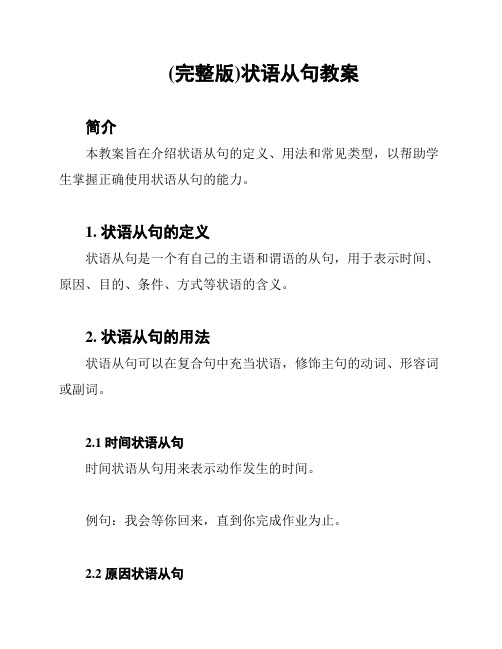
(完整版)状语从句教案简介本教案旨在介绍状语从句的定义、用法和常见类型,以帮助学生掌握正确使用状语从句的能力。
1. 状语从句的定义状语从句是一个有自己的主语和谓语的从句,用于表示时间、原因、目的、条件、方式等状语的含义。
2. 状语从句的用法状语从句可以在复合句中充当状语,修饰主句的动词、形容词或副词。
2.1 时间状语从句时间状语从句用来表示动作发生的时间。
例句:我会等你回来,直到你完成作业为止。
2.2 原因状语从句原因状语从句用来表示主句中的动作的原因或理由。
例句:因为天气太冷,所以我们取消了野餐计划。
2.3 目的状语从句目的状语从句用于表示主句中的动作的目的或意图。
例句:我来这里是为了研究更多的知识。
2.4 条件状语从句条件状语从句用来表示主句中的动作发生的条件。
例句:如果明天下雨,我们就取消郊游活动。
2.5 方式状语从句方式状语从句用来表示主句中的动作发生的方式或方法。
例句:她以一种非常温柔地方式对待孩子们。
3. 练请在下列句子中选择正确的状语从句填空:1. 我会等你回来,______你完成作业为止。
A. 除非B. 既然C. 因为2. 她去超市买了很多东西,______家里没有食物了。
A. 因此B. 只要C. 不管3. 如果你迟到了,______开车去学校。
A. 我们会B. 我会C. 我们不会参考答案:1. A2. A3. B结语通过学习本教案,希望学生们能够理解并正确运用状语从句,提高英语写作和口语表达的能力。
状语从句教案
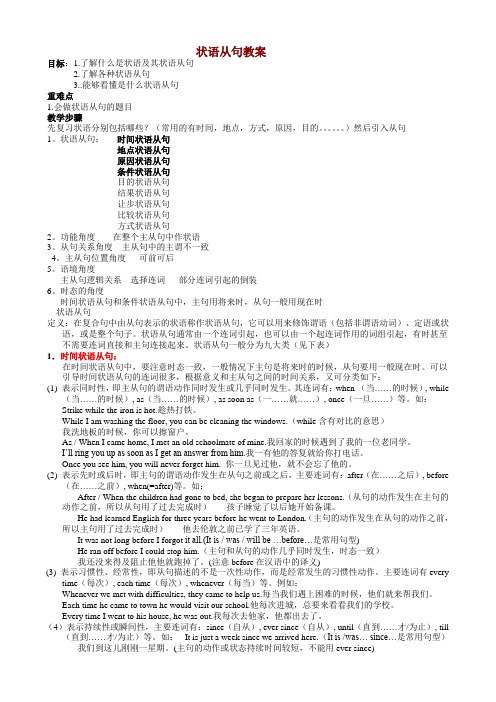
状语从句教案目标:1.了解什么是状语及其状语从句2.了解各种状语从句3..能够看懂是什么状语从句重难点1.会做状语从句的题目教学步骤先复习状语分别包括哪些?(常用的有时间,地点,方式,原因,目的。
)然后引入从句1。
状语从句:时间状语从句地点状语从句原因状语从句条件状语从句目的状语从句结果状语从句让步状语从句比较状语从句方式状语从句2。
功能角度在整个主从句中作状语3。
从句关系角度主从句中的主谓不一致4。
主从句位置角度可前可后5。
语境角度主从句逻辑关系选择连词部分连词引起的倒装6。
时态的角度时间状语从句和条件状语从句中,主句用将来时,从句一般用现在时状语从句定义:在复合句中由从句表示的状语称作状语从句,它可以用来修饰谓语(包括非谓语动词)、定语或状语,或是整个句子。
状语从句通常由一个连词引起,也可以由一个起连词作用的词组引起,有时甚至不需要连词直接和主句连接起来。
状语从句一般分为九大类(见下表)1.时间状语从句:在时间状语从句中,要注意时态一致,一般情况下主句是将来时的时候,从句要用一般现在时。
可以引导时间状语从句的连词很多,根据意义和主从句之间的时间关系,又可分类如下:(1) 表示同时性,即主从句的谓语动作同时发生或几乎同时发生。
其连词有:when (当……的时候), while(当……的时候), as(当……的时候), as soon as(一……就……), once(一旦……)等。
如:Strike while the iron is hot.趁热打铁。
While I am washing the floor, you can be cleaning the windows.(while含有对比的意思)我洗地板的时候,你可以擦窗户。
As / When I came home, I met an old schoolmate of mine.我回家的时候遇到了我的一位老同学。
I’ll ring you up as soon as I get an answer from him.我一有他的答复就给你打电话。
- 1、下载文档前请自行甄别文档内容的完整性,平台不提供额外的编辑、内容补充、找答案等附加服务。
- 2、"仅部分预览"的文档,不可在线预览部分如存在完整性等问题,可反馈申请退款(可完整预览的文档不适用该条件!)。
- 3、如文档侵犯您的权益,请联系客服反馈,我们会尽快为您处理(人工客服工作时间:9:00-18:30)。
状语从句——条件状语从句适用学科英语适用年级初中二年级适用区域北京课时时长(分钟)60知识点状语从句(2)条件状语从句教学目标掌握条件状语从句的用法教学重点条件状语从句的用法教学难点条件状语从句用法一、复习预习状语从句指句子用作状语时,起副词作用的句子。
它可以修饰谓语、非谓语动词、定语、状语或整个句子。
根据其作用可分为时间、地点、原因、条件、目的、结果、让步、方式和比较等从句。
状语从句一般由连词(从属连词)引导,也可以由词组引起。
从句位于句首或句中时通常用逗号与主句隔开,位于句尾时可以不用逗号隔开。
二、知识讲解知识点:【考查点1】引导条件状语从句最常用的连词是if,常见的if条件状语从句表示在某条件下,某事很可能发生,条件是可能存在的,主句中某种情况发生的概率也是很高的。
如:If you ask him,he will help you.如果你请他帮忙,他会帮你的。
If you fail in the exam,you will let him down.如果你考试不及格,你会让他失望的。
If you have finished the homework,you can go home.如果你作业做完了就可以回家了。
另外,if从句还表示不可实现的条件或根本不可能存在的条件,也就是一种虚拟的条件或假设。
从句多用一般过去时或过去完成时,表示对现在或过去的一种假设。
如:If I were you,I would invite him to the party.如果我是你,我会邀请他参加聚会。
I would have arrived much earlier if I had not been caught in the traffic.要不是交通堵塞,我本会来得早一些。
【考查点2】另外要注意if 条件句的时态搭配1.if从句用一般现在时,主句用一般将来时If he runs he’ll get there in time. 如果他用跑的,他就会及时赶到那儿。
The cat will scratch you if you pull her tail. 如果你拉猫的尾巴,它就会抓你。
2.if从句用一般现在时,主句用may/might/canIf the fog gets thicker the plane may/might be diverted. 如果雾在大一些,飞机可能就会改在别的机场降落。
If it stops snowing we can go out. 如果雪停了,我们就可以出去。
3.if从句用一般现在时,主句用must/shouldIf you want to lose weight you must/should eat less bread. 如果你想减肥,你必须少吃面包。
4.if从句用一般现在时,主句用一般现在时If you heat ice it turns to water. (也可用will turn)如果把冰加热,它就会化成水。
5.if从句用现在进行时,主句用一般将来时If you are looking for Peter you’ll find him upstairs. 如果你是在找彼得,上楼就会找到他。
6.if从句用现在完成时,主句用一般将来时If you have finished dinner I’ll ask the waiter for the bill. 如果你吃完了,我就叫服务生来算账注意:学习" if " 引导的条件状语从句的用法,现在总结一下:if 条件句不一般,几个要点记心间;条件句,放在前,逗号要放句中间。
条件句表可能,主句多用将来时;条件句表事实,主句常用现在时。
在if 引导的条件状语从句中,如果从句谈论的是一个有可能发生的事实及其产生的相关的结果,主句用一般将来时态,从句用一般现在时态。
如:We can walk there if we can't find a bus .If it rains tomorrow ,we will not go to the zoo.What will you do if you find a panda in danger.如果if 条件句谈论的是重复发生和预示要发生的情景和事件,则主从句大多用一般现在时态。
如:If bears are in danger ,they attack people.在if 引导的条件状语从句中,if 和条件句位置灵活,可直接放在主句后面,若if 条件句放句首,从句后面要加逗号,和主句隔开。
还要注意前后时态一致原则三、例题精析【例题1】【题干】If you _____ to the party, you’ll have a great time.A. will goB. wentC. goD. going【答案】C【解析】if从句用现在进行时,主句用一般将来时【例题2】【题干】–What are you going to do tomorrow?--We’ll go to the library tomorrow if it ___.A. isn’t rainB. rainC. won’t rainD. doesn’t rain【答案】D【解析】if从句用现在进行时,主句用一般将来时【例题3】【题干】如果Tom考试不及格,他就没有机会上高中了。
Tom _________have the ________to go to the high school if he ________ theexams.【答案】won’t; fails【解析】四、课堂运用【基础】用所给词的适当形式填空1.If you ________(feel) tired, you _______________ (have) to have a rest.2. Where _______ he _________(see) the film if he ________________(have) time?3. If there __________(be) fewer trees, there _______________( be) more pollution.4. He _____________(dress) more casually if he ________________( not work) onweekends.5. If Marcia _____________(live) alone, she ___________________( keep) a pet parrot.【巩固】6.如果他到的晚了会发生什么事情?What _______________ if he _____________ late?7. 如果努力学习,你就会取得好成绩。
If you__________ _________, you ___________ good _____________.8. 他如果看电视太久了,他的父母会不高兴。
If he _________ TV too much, his parents __________ __________ unhappy.9. 如果我们为他组织生日聚会,大家都会来的。
Everyone ________________ if we _____________ a birthday party __________ him.【拔高】10. I’ll give the book to him if he ___ here next Sunday.A. will comeB. comesC. is comingD. came11. There ____an English film in our school tomorrow.A. is going to haveB. will haveC. is going to beD. has12. Could you tell us where ____?A. will the next Olympic Games heldB. the next Olympic Games will be heldC. would the next Olympic Games be heldD. the next Olympic Games would be held答案与解析1.feel; have2. will, see; has3. are; will be4. will dress; doesn’t work5.lives; will keep6. will happen; is7.work hard; will get, grades8.watches; won’t be9. will come; hold, for10.B11. C12. B课程小结条件状语从句主要的考点是时态的问题,需要通过很多练习使学生得到巩固。
课后作业【基础】1. Lana ______________( buy) a new dress if the old one ____________(be) out of style.2.The twins ______________(fight) if they_______________(argue).3. I ____________(have) a bake sale if I _____________(need) money for education.4. Peter ___________( send) me a beautiful souvenir if he ______________(tour) Spain.5. If Mr Green ___________(say) I am hard- working, my parents _________( feel) glad.【巩固】6. 如果明天不下雨,我会和你一起去公园的。
If it __________ __________ tomorrow, I ____________go to the park _________ you.7. 如果她睡过头了,就会旅游迟到的。
She__________________________ the trip if she ___________________.8. 如果他有空,他会帮助你的。
If he _________________, he _________________ you.9. 你如果抄同学的作业就不能学好各门功课。
